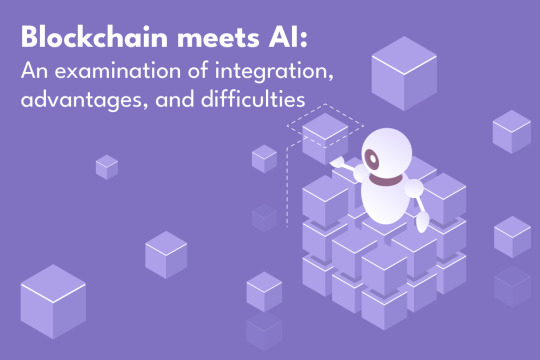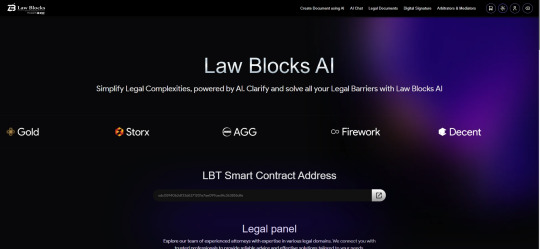#blockchain in AI
Explore tagged Tumblr posts
Text
Blockchain meets AI: an examination of integration, advantages, and difficulties

Introduction
Blockchain technology and AI (artificial intelligence) are two of the most disruptive technologies of our age. Blockchain technology provides a secure, decentralized mechanism for the storage and transmission of information, while AI gives opportunities to analyze data in ways unimaginable before. These, when combined, can change industries completely and create new growth opportunities.
However, it is not easy to integrate blockchain and AI. This requires in-depth knowledge of both technologies as well as the ability to handle the technical and regulatory challenges that come with their fusion. That’s where a blockchain consulting company comes in.
A blockchain consulting company refers to a specialized firm that offers expert advice and assistance concerning blockchain development and implementation. They have deep understandings of the technical and regulatory environment of blockchain as well as the capabilities to navigate the complexities associated with making blockchains compatible with other technologies, such as AI.
By collaborating with this company, organizations can ensure that their integration between blockchain and AI will be successful and bring anticipated advantages. A blockchain consulting company can help an organization:
Understanding the technological landscape of areas like blockchain or AI from a regulatory perspective
Selecting appropriate blockchain platforms and AI tools for use cases
Developing business-aligned strategies for integrating blockchain with AI
Ensuring the security and scalability of its merger between artificial intelligence-enabled systems powered by blockchains
Understanding regulatory barriers that hinder efforts towards adopting this type of partnership
In essence, if any organization wants to enjoy the benefits offered by merging these two technologies, then they must work closely with the right experts from a blockchain consulting company who will guide them through all hitches that occur during implementation, including those arising from legal restrictions.
What is blockchain?
Blockchain is a digital ledger system characterized by decentralization, thus promoting transparency in record-keeping practices. Rather than having one central authority maintain it, this distributed database is operated by several computers connected together via internet channels. Its decentralization makes it highly secure, preventing fraud or tampering.
Essentially, a blockchain is a series of blocks, each having records of transactions. These blocks are connected by means of cryptography, which makes it difficult for anyone to tamper with their data.
Blockchain technology has multiple uses, ranging from cryptocurrency and payments to supply chain management to voting processes. Key features include:
Decentralization: Blockchain systems do not have a central authority in control but instead are run by multiple computers, each with its own copy of the blockchain.
Security: The security and integrity of transactions being carried out in blockchain rely on the use of cryptography. Each block in the blockchain is linked to the next one using a unique code that makes it virtually impossible to change any content without being detected.
Transparency: It has been designed as an open system where every transaction can be seen by everyone within the network. Such transparency minimizes opportunities for corruption and fraud.
Immutability: Once something is entered onto this digital platform, such as a financial transaction, it remains there forever. This creates permanent audit trails for all activities recorded on this system.
Blockchain Development Services
Blockchain technology is quite intricate, and therefore, it is important to engage a team of experienced blockchain developers for the success of your blockchain project. Blockchain Development Services offers expertise and resources that are necessary for creating, developing, and deploying customized blockchain solutions tailored to fit your individual requirements.
The following are the ways blockchain development services can help:
Identification of the right blockchain platform suitable for your use case
Designing and developing a tailor-made blockchain solution consistent with business objectives.
Ensuring security and scalability within your blockchain solution
Integrating your blockchain solution with other systems as well as technologies
Provision of continuous support and maintenance services for your blockchain solution
Involving experienced stakeholders in developing a successful blockchain project is something that should be emphasized if tangible benefits are to be derived from it. You could want to make a cryptocurrency, supply chain management system, or vote. Consider contacting Block Chain Development Services, which will help you attain what you are pursuing here.
What is AI?
Artificial intelligence (AI) refers to the creation of computer systems able to perform tasks that usually require human intelligence, such as visual perception, speech recognition, decision-making, and language translation. AI systems apply algorithms together with machine learning styles in analyzing data, discerning patterns, and making decisions with minimal human intervention.
The different types of AI include:
Narrow AI: this kind is only meant for doing some particular job, such as voice recognition or image analysis. Narrow AI systems have limited capabilities; they cannot do anything outside their specific domain.
General AI: This kind refers to any intellectual activity performed by an ordinary human being. General AI systems are still under development and are not widely accessible yet.
Superintelligent AI: The term “superintelligent” was hypothetical, referring to an intelligence system far more developed than average humans. Superintelligent AI does not exist yet, though scientists continue to discuss it extensively.
AI has extensive applications across various industries, including healthcare, finance, and transportation, among others. It has the following key features:
Automation: AI can automate repetitive and time-consuming tasks, freeing up human resources for more strategic and creative work.
Predictive Analytics: Using AI, it is possible to analyze big data and find patterns or trends that could be used to forecast future happenings.
Personalization: With AI, one can analyze individual preferences and behaviors so that personalized recommendations are made possible.
Natural Language Processing: In addition to this, AI performs analysis on languages spoken by people, thereby making communication between individuals and machines easier.
AI technology is a fast-developing field, with new breakthroughs being achieved on a regular basis. As AI continues to advance, its potential applications and impact on society will only continue to grow.
In the next section, we will discuss how blockchain and artificial intelligence (AI) can be integrated together to create new opportunities for innovation and growth. We will also examine such aspects as the advantages of the blockchain-AI integration process, the challenges posed by it, the role of blockchain development services in this context, and the roles played by blockchain consulting companies within these borders.
Integration of blockchain and AI
The fusion of blockchain with artificial intelligence (AI) represents an influential blend of technologies that could reshape multiple industries. By combining blockchain’s security and transparency with the analytical capabilities of AI, organizations can discover new possibilities for innovation as well as operational efficiency.
Advantages of Integrating Blockchain with AI
1.Enhanced Security: The decentralized and immutable attribute of blockchain can enhance AI systems security by giving a tamper-proof record of data and transactions.
2. Improved Data Quality: Blockchain-stored information can be analyzed by the artificial intelligence algorithms for insights that are valuable to improving decision-making processes.
3. Increased Efficiency: Tasks within blockchain networks may be automated by the use of artificial intelligence, thus simplifying processes and reducing operational costs.
4. Smart Contracts: Artificial intelligence is used in optimizing and automating smart contracts’ execution on blockchain platforms, which enhances accuracy and efficiency.
5. Predictive Analytics: By combining blockchain data with artificial intelligence algorithms, organizations can extract predictive insights into things like market trends, customer behavior, or even operational performance.
Challenges to Combining Blockchain and AI
1. Technical Complexity: It requires expertise in both of these areas to integrate blockchain with AI technologies due to the technical complexities involved.
2. Scalability: For instance, as data volume increases, ensuring that blockchain networks can handle the computational demands of AI algorithms poses a challenge.
3. Interoperability: Differences between protocols and data formats make communication between blockchain and AI systems difficult.
4.Regulatory Uncertainty: Compliance and data protection present major complications since there are no clear regulations governing the integration of blockchain with AI technology yet.
Live visibility and traceability of products and materials in the supply chain can be improved by combining blockchain technology with AI. Organizations can optimize their supply chain processes using AI algorithms that are used to study patterns and trends in blockchain data, thus reducing costs.
Enhanced Customer Experience:
AI is capable of personalizing customer experiences through the analysis of blockchains to understand customer behavior as well as preferences. They are able to provide customers with more individualized, secure, trusting, and engaging experiences, leveraging the transparency and safety net that blockchain offers.
Hire blockchain developers.
For businesses to get the maximum benefits out of the integration of blockchain with AI, it’s important for them to engage experienced professional programmers who know how to develop software based on both of these technologies. Companies employing blockchain developers can:
Create a product or platform that meets company-specific requirements.
Make sure their integration between blockchain and AI is secure and scalable.
Address issues related to legislative compliance.
Ensure that their systems run most efficiently; hence, maximize the utility arising out of the convergence between blockchain and AL.
Difficulties of Blockchain-AI Integration
Although the blending of AI with blockchain has a promising future in various industries, it has some challenges. However, there are some challenges that need to be resolved if the potential benefits of integrating AI with blockchain are going to be fully exploited:
Scalability: Scalability is one of the main issues in integrating blockchain with artificial intelligence (AI). In order for AI systems requiring real-time data processing to be integrated with the slow transaction processing speed characteristic of many block chains (Kambatla et al., 2014),.
Data privacy and security: The other challenge lies in data privacy as well as security for the combination between blockchain technology and artificial intelligence (AI). It’s hard for one person or group since its decentralized aspect implies each node having limited access controls towards ensuring confidentiality or integrity is maintained regarding information stored within the distributed ledger environment provided by Bockchain.
Interoperability: Also, interoperability is a major barrier to the integration of AI and blockchain. For instance, different blockchain networks are designed with varying protocols and standards that make it difficult for them to connect seamlessly with other AI systems.
Regulatory challenges: Additionally, the integration of blockchain technology with artificial intelligence has brought regulatory challenges. The use of AI algorithms in blockchain networks has raised concerns due to their potential biases and discrimination (Lepri et al., 2017).
Lack of standards: The lack of guidelines as well as best practices concerning the combination of blockchain and AL can hinder organizations from implementing solutions to scale.
High cost: Implementing blockchain-AL convergence could be expensive since it requires significant investment in infrastructure, building up, and maintaining the technology.
Lack of expertise: Companies may also find it challenging to implement suitable plans due to a lack of professionals who understand what it takes to combine these two technologies.
These companies can help organizations navigate the complexities of blockchain-AI integration and ensure that their solutions are scalable, secure, and compliant with regulatory requirements. It is important for organizations grappling with implementing or scaling blockchain-AI solutions to consider engaging skilled developers who specialize in this specific area.
Conclusion
In conclusion, the integration of blockchain and AI has the potential to bring about transformative changes in various industries. By bridging decentralization and security attributes that exist within block chains with the ability of AI systems for data analysis and interpretation, new opportunities will emerge, leading to an innovative growth process.
Nevertheless, blockchain-AI integration is a challenge that is not without its challenges. To fully realize the potential of blockchain-AI integration, there are some difficulties, such as scalability, data privacy and security, interoperability, regulatory challenges, lack of standards, high cost, and lack of expertise, that have to be addressed.
In addition to these obstacles, it is important to engage experienced BaaS providers or consulting firms that specialize in blockchain-AI integration. This will save enterprises from the complexity of blockchains’ AI structures and ensure they deliver scalable solutions with the highest level of safety for customers’ personal data.
These challenges can be overcome by hiring blockchain developers with expertise in this field. They help organizations come up with tailored solutions to satisfy their individual needs and requirements.
More companies are expected to explore blockchain-AI integration. As technology advances, we will see other areas where it will be used, hence opening new doors for innovation and growth.
2 notes
·
View notes
Text
"I find my feelings about AI are actually pretty similar to my feelings about blockchains: they do a poor job of much of what people try to do with them, they can't do the things their creators claim they one day might, and many of the things they are well suited to do may not be altogether that beneficial. And while I do think that AI tools are more broadly useful than blockchains, they also come with similarly monstrous costs."
-Molly White
327 notes
·
View notes
Text

#ai artwork#ai#sexy and beautiful#sexy pose#ai generated#ai image#sexy chick#ai art#so hot and sexy#ai girl#crypto mogul#blockchain
28 notes
·
View notes
Text
The Four Horsemen of the Digital Apocalypse
Blockchain. Artificial Intelligence. Internet of Things. Big Data.
Do these terms sound familiar? You have probably been hearing some or all of them non stop for years. "They are the future. You don't want to be left behind, do you?"
While these topics, particularly crypto and AI, have been the subject of tech hype bubbles and inescapable on social media, there is actually something deeper and weirder going on if you scratch below the surface.
I am getting ready to apply for my PhD in financial technology, and in the academic business studies literature (Which is barely a science, but sometimes in academia you need to wade into the trash can.) any discussion of digital transformation or the process by which companies adopt IT seem to have a very specific idea about the future of technology, and it's always the same list, that list being, blockchain, AI, IoT, and Big Data. Sometimes the list changes with additions and substitutions, like the metaverse, advanced robotics, or gene editing, but there is this pervasive idea that the future of technology is fixed, and the list includes tech that goes from questionable to outright fraudulent, so where is this pervasive idea in the academic literature that has been bleeding into the wider culture coming from? What the hell is going on?
The answer is, it all comes from one guy. That guy is Klaus Schwab, the head of the World Economic Forum. Now there are a lot of conspiracies about the WEF and I don't really care about them, but the basic facts are it is a think tank that lobbies for sustainable capitalist agendas, and they famously hold a meeting every year where billionaires get together and talk about how bad they feel that they are destroying the planet and promise to do better. I am not here to pass judgement on the WEF. I don't buy into any of the conspiracies, there are plenty of real reasons to criticize them, and I am not going into that.
Basically, Schwab wrote a book titled the Fourth Industrial Revolution. In his model, the first three so-called industrial revolutions are:
1. The industrial revolution we all know about. Factories and mass production basically didn't exist before this. Using steam and water power allowed the transition from hand production to mass production, and accelerated the shift towards capitalism.
2. Electrification, allowing for light and machines for more efficient production lines. Phones for instant long distance communication. It allowed for much faster transfer of information and speed of production in factories.
3. Computing. The Space Age. Computing was introduced for industrial applications in the 50s, meaning previously problems that needed a specific machine engineered to solve them could now be solved in software by writing code, and certain problems would have been too big to solve without computing. Legend has it, Turing convinced the UK government to fund the building of the first computer by promising it could run chemical simulations to improve plastic production. Later, the introduction of home computing and the internet drastically affecting people's lives and their ability to access information.
That's fine, I will give him that. To me, they all represent changes in the means of production and the flow of information, but the Fourth Industrial revolution, Schwab argues, is how the technology of the 21st century is going to revolutionize business and capitalism, the way the first three did before. The technology in question being AI, Blockchain, IoT, and Big Data analytics. Buzzword, Buzzword, Buzzword.
The kicker though? Schwab based the Fourth Industrial revolution on a series of meetings he had, and did not construct it with any academic rigor or evidence. The meetings were with "numerous conversations I have had with business, government and civil society leaders, as well as technology pioneers and young people." (P.10 of the book) Despite apparently having two phds so presumably being capable of research, it seems like he just had a bunch of meetings where the techbros of the mid 2010s fed him a bunch of buzzwords, and got overly excited and wrote a book about it. And now, a generation of academics and researchers have uncritically taken that book as read, filled the business studies academic literature with the idea that these technologies are inevitably the future, and now that is permeating into the wider business ecosystem.
There are plenty of criticisms out there about the fourth industrial revolution as an idea, but I will just give the simplest one that I thought immediately as soon as I heard about the idea. How are any of the technologies listed in the fourth industrial revolution categorically different from computing? Are they actually changing the means of production and flow of information to a comparable degree to the previous revolutions, to such an extent as to be considered a new revolution entirely? The previous so called industrial revolutions were all huge paradigm shifts, and I do not see how a few new weird, questionable, and unreliable applications of computing count as a new paradigm shift.
What benefits will these new technologies actually bring? Who will they benefit? Do the researchers know? Does Schwab know? Does anyone know? I certainly don't, and despite reading a bunch of papers that are treating it as the inevitable future, I have not seen them offering any explanation.
There are plenty of other criticisms, and I found a nice summary from ICT Works here, it is a revolutionary view of history, an elite view of history, is based in great man theory, and most importantly, the fourth industrial revolution is a self fulfilling prophecy. One rich asshole wrote a book about some tech he got excited about, and now a generation are trying to build the world around it. The future is not fixed, we do not need to accept these technologies, and I have to believe a better technological world is possible instead of this capitalist infinite growth tech economy as big tech reckons with its midlife crisis, and how to make the internet sustainable as Apple, Google, Microsoft, Amazon, and Facebook, the most monopolistic and despotic tech companies in the world, are running out of new innovations and new markets to monopolize. The reason the big five are jumping on the fourth industrial revolution buzzwords as hard as they are is because they have run out of real, tangible innovations, and therefore run out of potential to grow.
#ai#artificial intelligence#blockchain#cryptocurrency#fourth industrial revolution#tech#technology#enshittification#anti ai#ai bullshit#world economic forum
32 notes
·
View notes
Text

Feb 14 (Reuters) - The rise of "pig butchering" scams and the increasing use of generative artificial intelligence likely lifted revenues from crypto scams to a record high in 2024, according to blockchain analytics firm Chainalysis.
Revenue from pig butchering scams, where perpetrators cultivate relationships with individuals and convince them to participate in fraudulent schemes, increased nearly 40% in 2024 from the previous year, the firm estimated in a report published on Thursday.
Revenue in 2024 from crypto scams was at least $9.9 billion, although the figure could rise to a record high of $12.4 billion once more data becomes available, it said.
"Crypto fraud and scams have continued to increase in sophistication," Chainalysis researchers said.
The company pointed to marketplaces that support pig butchering operations and the use of GenAI as factors making it easier and cheaper for scammers to expand operations.
https://www.reuters.com/technology/crypto-scams-likely-set-new-record-2024-helped-by-ai-chainalysis-says-2025-02-14/
#crypto#reuters#bitcoin#ethereum#money#finance#economy#ai#artificial intelligence#politics#political#us politics#news#cash#digital currency#bitlocker#digita wallet#crypto exchange#blockchain#financial#economic#economics#non-fungible token#NFT#stablecoin#virtual currency#bitcoin mining#government#regulation#scams
15 notes
·
View notes
Text










Hello fam I just made another digital art titled Golden Dunes Suitable for small wall art prints, digital downloads, digital posters and social media posts available in PDF and PNG format.
The size is 2500×2500 pixels At 300 DPI, this size will be 8x8 inches (20x20 cm) after printing. Don't forget to like, comment and share it will mean a lot to me.
I'm a self taught digital artist I need your support to become a professional someday 🙏 Please Petronize my artworks so I can grow thank you for your time.
#art#digital art#home decor#artwork#nft#painting#interior design#united states#ai#blockchain#interior decor ideas#home interior#interior decorating#interiors#office decor#office interior design#art lovers on tumblr#artists on tumblr#small artist#small art account#design#hotel decor#hotel design#australia#austria#china#canada#mexico#sweden#turkey
8 notes
·
View notes
Text

aabon35
#stained#glass#cathedrals#stainedglass#http://aabon35.blogspot.com⚫️ http://arubio28814.blogspot.com#gothicglass#seo#rosewindow#stainedglasswindows#nftsstories#marbles#catedrales#art#ai#NFTCommunity#x#a#Jellesmarbles#ia#nft#eth#nftgallery#blockchain#CatedraldeMallorca#cryptoartist#nftartgallery#nftartists#openseanft#ethereum#nftartwork
17 notes
·
View notes
Text
Empower Your Digital Presence with Cutting-Edge Frameworks
In today’s fast-evolving digital landscape, staying ahead requires more than just a functional website or application—it demands innovation and efficiency. At Atcuality, we specialize in Website and Application Framework Upgrade solutions tailored to your business goals. Whether you're looking to optimize performance, enhance user experience, or integrate the latest technologies, our team ensures seamless upgrades that align with industry standards. Transitioning to advanced frameworks not only improves loading speeds and scalability but also strengthens your cybersecurity measures. With Atcuality, you gain access to bespoke services that future-proof your digital assets. Let us elevate your online platforms to a new realm of excellence.
#ai applications#artificial intelligence#ai services#website development#website developer near me#website developers#website developer in india#web development#web design#application development#app development#app developers#digital marketing#seo services#seo#emailmarketing#search engine marketing#search engine optimization#digital consulting#virtual reality#vr games#vr development#augmented reality#augmented and virtual reality market#cash collection application#task management#blockchain#metaverse#cloud computing#information technology
8 notes
·
View notes
Text
Chapter 1: Spark From You Are Debt Free — a deeply personal NFT project using handwritten love letters and AI-generated art to fight economic violence.
This isn't just a visual story. It's a promise in motion. Ten chapters, no royalties, total anonymity — until the day I tell her: You Are Debt Free.
Created to fund freedom from predatory debt, this project turns love, pain, and resistance into art on the blockchain.
Explore the collection: https://opensea.io/youaredebtfree
#nft art#ai art#love letters#you are debt free#yadf#personal project#economic violence#art for change#cryptoart#conceptual art#storytelling art#handwritten letters#emotional liberation#blockchain for good#nft collection#web3 art#tumblr art#financial justice
4 notes
·
View notes
Text
Comment ‘Money’ and I’ll personally DM you the full conversation!
What if everything you thought you knew about investing is about to change forever?
Well, today’s guest on The Diary Of A CEO is here to prove exactly that.
I recently sat down with Investing Expert @cathiewoodark to get her to reveal the best investments to make in 2025 that will make you rich fast!
Cathie doesn’t just react to the future. She bets her life on it. She left a comfortable, high-paying job in traditional finance because she believed something the world didn’t believe yet that innovation would reshape everything.
She was buying Tesla when Wall Street was calling it a joke. She was investing in Bitcoin when it was trading at $250.
And today, she believes AI will generate over $200 trillion in productivity by 2030.
We covered:
- The Top Ten Public Investments People Should Consider!
- The Simple Strategy That Will Skyrocket Your Passive Income…
- How Tesla’s Autonomous Taxis And Humanoid Robots Will Reshape Entire Industries?!
- Why We Need To Stop Calling It ‘Crypto’?
- The Big Shift That Is Coming In The Next Five Years…
And more.
What I really like about Cathie is that she does a great job in translating complex research into simple language and information that the next generation can understand so that this moment of transition doesn’t catch them off guard.
In a world that’s changing faster than ever, Cathie’s perspective is a powerful reminder that the biggest risk we can take is to do nothing.
Watch the full episode now on YouTube: search “The Diary of a CEO Cathie Wood”
#technology#my art#blockchain#altcoin#bitcoin#art#crypto#forex#ai art#ai technology#ai tools#ai trader#ai trends#ai transformation#robots
3 notes
·
View notes
Text
"Looks like a train got stuck in the bog and I'm thinking, that's a nice little hut for making the tea."
"These stamps feel like an agreement that was made at a dinner party."
"The future of housing we have all been hoping for, living in a rusty metal ewok village where you break your ankles after coming out the front door to an unguarded one meter drop. Thank you an post"
11 notes
·
View notes
Link
Já vimos esse filme antes: surge uma nova tendência, tecnologia ou regulamentação, e de um dia para o outro aparecem dezenas, centenas de especialistas autoproclamados sobre o tema, vendendo palestra, consultoria e treinamentos. Pessoas que, até ontem, nunca tinham ouvido falar do tema, agora se vendem como mestres da inovação, prontos para transformar seu negócio. Foi assim com a LGPD (Lei geral de proteção de dados pessoais), a partir de 2018, quando muitos, a maioria profissionais do direito, se tornaram "especialistas" da noite para o dia, apenas repetindo o que outros diziam e atualizando seus currículos para um tal de especialista em Direito Digital ( que sequer existe dentro das especialidades do Direito Brasileiro). Agora, a Inteligência Artificial virou a bola da vez, e o mesmo fenômeno acontece: aparecem "revolucionários da IA" que nunca escreveram uma linha de código ou de programação, não sabem diferenciar deep learning de machine learning, mas garantem que vão transformar sua empresa. Mas essa não é uma novidade. Outras ondas de mercado já produziram falsos gurus antes.
#ai#blockchain#charlatão#criptomoedas#falsoguru#falsoprofeta#guru#ia#lgpd#metaverso#profetas#tecnologia
5 notes
·
View notes
Text
youtube
2024 is now grimly underway, and we have our traditional annual statement/threat from Square Enix, promising yet more terrible futures that we do not want. Let's mock and hate Square Enix's horrid plans to exploit A.I. and other tech fads while asking why they're not creaming their jeans about NFTs anymore!
43 notes
·
View notes
Text

Here’s what legal teams are learning:
➡️You can search any contract in seconds ➡️Files stay tamper-proof with blockchain ➡️ Signatures are 100% valid & secure
That’s the Law Blocks AI way.
Dive deeper → http://lawblocks.io/blogdetails/in-house-legal-teams-choosing-law-blocks-ai
2 notes
·
View notes
Text
GOLDEN Diamond Dog 1/1 NFT

👆👆👆🔥 Just dropped a 1/1 luxury NFT masterpiece!
💎 Golden Diamond Dog – Fully wrapped in gold, with diamond teeth, gemstone eye & pearl earrings. A symbol of digital royalty.
🎨 Only ONE exists – live now on Polygon!
#nftcommunity#nftcollectors#nft crypto#nftmarketplace#nftart#web3#nft#digitalcurrency#defi#crypto#crop top#airdrop#solana#blockchain#crypto market#dogs of tumblr#dog#dog man#dogblr#bungou stray dogs#doggo#ai generated#ai artwork#ai art#ai image#uehara#binance#opensea#nftcollectibles#c.ai bot
3 notes
·
View notes